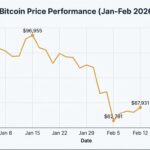
Decentralized exchange faces backlash from top DAO over radical tokenomics shift as market reacts to deflation push.
PancakeSwap, the leading BNB Chain decentralized exchange (DEX), ignited a governance firestorm with its Tokenomics 3.0 proposal to retire the veCAKE system—a move decried by its largest stakeholder, Cakepie DAO, as a “betrayal of long-term builders.” The plan, revealed on April 8, 2025, triggered a 12% CAKE price surge to $1.81 as traders bet on its deflationary mechanics, but critics warn it risks centralizing power and alienating core contributors .
As of April 9, 2025, CAKE, the native token of PancakeSwap, is priced at $1.92, showing resilience after dipping to multi-week lows earlier today. The price reflects growing market confidence in the recently announced CAKE Tokenomics 3.0, which axes the veCAKE system to cut emissions and ramp up burns. Trading volume has spiked past $125 million in the last 24 hours.
The veCAKE : Incentives vs. Efficiency
At the heart of the clash is veCAKE, a governance model where users lock CAKE tokens to gain voting rights and direct liquidity rewards. PancakeSwap argues the system has led to skewed incentives, with “low-volume pools receiving disproportionate emissions” due to bribe-driven voting .

CAKE Tokenomics 3.0, PancakeSwap’s bold fix. The proposal, kills off veCAKE, gauges voting, and revenue sharing. Daily emissions will drop from 40,000 to 22,500 Cake tokens, and trading fees will fuel token burns instead of staker payouts.
If it passes, locked Cake tokens unlock instantly. Emissions will hinge on real-time data, rewarding pools with the most action. PancakeSwap’s target? A 4% annual deflation rate, slashing the Cake supply by 20% over five years.
The new proposal replaces veCAKE with a streamlined model:
- Emissions slashed 44% (40,000 → 22,500 CAKE/day)
- All staked CAKE unlocked immediately, ending multi-year lockups
- Revenue redirected to burns, targeting 4% annual deflation
PancakeSwap claims this shift prioritizes “true ownership” and market-driven liquidity. Yet Cakepie DAO—which locked 13 million CAKE (worth ~$23 million)—countered that the abrupt change “rewards whales over builders” and destabilizes projects built atop veCAKE’s framework .
“Governance Attack” Allegations Surface
The reaction? A mixed bag. Cakepie, a project tied to veCAKE, called it a “devastating blow” on X, warning of broken trust, lost income for holders, and a rush to sell Cake. Other voices back the shift, saying veCAKE failed to lure new stakers or burn enough tokens.
One X user quipped, “Everyman for themself in Bear markets (for the better?)” It’s a debate pitting protocol health against user perks, with no clear winner yet.
Tensions escalated as Cakepie DAO alleged potential manipulation: 25 million CAKE tokens were locked by unnamed wallets days before the proposal, raising concerns of a “governance attack” to sway voting . The DAO, which says it learned of the plan alongside the public despite years of collaboration, warned the move could “fracture trust across BNB Chain’s DeFi ecosystem” .
Critics argue removing veCAKE shifts influence from long-term holders to short-term speculators. “Weighted voting by lockup duration was a safeguard against whale dominance,” noted a Cakepie representative. “Now, governance risks becoming a playground for mercenary capital” .
Deflation vs. Decentralization: A Zero-Sum Game?

PancakeSwap isn’t shy about the why. The proposal states, “The veCAKE system resulted in inefficient emissions distribution, often rewarding low-volume pools disproportionately.” The new setup aims to match rewards with usage, not voting clout. It’s a shift from decentralized chaos to data-driven control.
This isn’t the first deflation play. In 2023, PancakeSwap cut Cake’s max supply from 750 million to 450 million, torching tokens and hitting a 2.7% deflation rate last year—tops among DEXs. Now, they’re doubling down.
PancakeSwap’s deflationary pivot mirrors broader industry trends, but analysts question its trade-offs:
- Pros: Reduced sell pressure from lower emissions, simplified user experience, and direct fee burns could boost CAKE’s scarcity narrative.
- Cons: Killing staking incentives may drive away yield-seeking users, while centralized emission management could stifle community-led innovation .
“This isn’t just about tokenomics—it’s a philosophical split,” said DeFi analyst Marco Polo. “PancakeSwap is betting that deflation and simplicity will attract mainstream users, but they’re gambling with the loyalty of their core DeFi base” .
Alternatives on the Table
Cakepie DAO proposed compromise solutions to preserve veCAKE’s role:
- Early exits with penalties (fees burned) to maintain flexibility
- Fee-sharing for active voters to sustain participation
- Direct rewards for high-value pools to address inefficiencies
PancakeSwap has yet to respond, but the DAO’s influence as a top liquidity provider adds weight to its demands. The final vote, expected by late April, will test whether the community prioritizes short-term price gains or long-term governance integrity.
The Bigger Picture: DeFi’s Governance Crossroads
The conflict underscores a recurring DeFi dilemma: How to balance tokenholder incentives, decentralization, and scalable growth. PancakeSwap’s bid to “simplify” governance risks mirroring centralized entities—a red flag for protocols built on community trust.
As CAKE’s price volatility reflects market uncertainty, the outcome could set a precedent for how major DEXs navigate tokenomics overhauls without alienating their most committed users. For now, all eyes are on whether PancakeSwap’s kitchen can handle the heat.
For ongoing updates, track the governance vote via PancakeSwap’s forum .
















 Join our Telegram Channel
Join our Telegram Channel